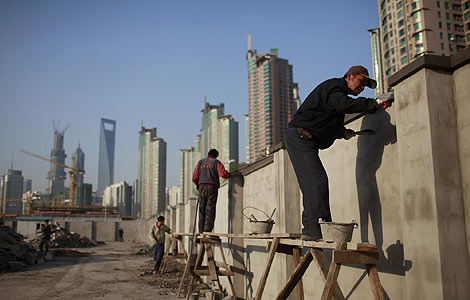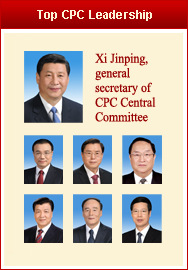CPC pledges to give the public more say
(Xinhua)
Updated: 2012-11-12 16:52
| ?
 |
|
Workers build walls at a construction site at Pudong Lujiazui financial area in Shanghai November 12, 2012.?[Photo/Agencies]
|
The Party has done so by giving them an adequate say in the authorities' decision-making.
"Whenever we make a decision involving the immediate interests of the people, we must solicit their views on it. We must not do anything that may harm the interests of the people and must correct any action that causes damage to their interests," Hu Jintao said in a report to the 18th CPC National Congress on Thursday.
However, Hu's words did not fill Zhang Shiyou, a farmer in a small town beside the Yangtze River in East China's Anhui province, with relief.
"Yes, we want the right to participate in decision-making. But it is not that easy," Zhang said.
In 2011, he led his fellow villagers onto the streets to protest against the Anhui Zhongyuan Chemical Industrial Company Ltd. plant near their village, which they said caused the deaths of fish, destruction of crops and led to unsafe drinking water. The plant was producing formaldehyde.
Eventually, the villagers, with the help of journalists and non-governmental environmental groups, made the local government order the plant to remove and earmarked money to clean up the environment.
"Nevertheless, we are still worried about the hidden dangers -- we do not know how many other projects threatening the environment are still operating near us or are going to come to us," he said. "We are eager for the right to be informed."
Calls for public participation
After more than 30 years of rapid development, China has become the second-largest economy in the world -- but at the cost of resources and the environment.
The expansive growth pattern and the fast pace of urbanization over the past decades have led to shortages of resources, environmental degradation and even worse, an increasing number of "mass incidents."
In 2012, three violent protests against the construction of chemical projects near residential compounds broke out in the southwestern Chinese city of Shifang, as well as eastern cities of Qidong and Ningbo. There were confrontations between local residents and government officials.
All of the projects were eventually scrapped and the public seemed to "win."
However, experts warned that authorities must seek a systematic solution to ease public fears about environmental pollution and distrust about the government. Otherwise, similar protests will happen again.
"In most cases, the government has not solicited public opinion well when it decides to launch a potentially polluting project. In addition, it has not done well in publicizing scientific knowledge to ease public worries," said Wang Kaiyu, a sociologist in Anhui province.
"China cannot develop in an all-around way without the chemical industry, but public health must be ensured at the same time," said Liu Zhibiao, president of the Jiangsu Provincial Academy of Social Sciences.
"People of all walks of life and various non-governmental organizations, especially specialized groups, should be given the chance to participate in the government's decision-making process, " he said.
The CPC has been aware of the destabilizing factors in the country's economic and social development.
In addition to pledging more say for the public in the authorities' decision-making, the Party has decided to solve the environmental problem.
In Thursday's report, Hu Jintao emphasized the importance of ecological progress and advocated the building of a "beautiful China" in the country's overall development plan.
"We must give high priority to making ecological progress, work hard to build a beautiful country, and achieve lasting and sustainable development of the Chinese nation," Hu said.
He gave ecological progress a more prominent position by incorporating it into the country's overall development plan together with economic, political, cultural and social progress.
"To build a beautiful China and a harmonious China, the Party must strike a balance between public appeals and economic development," said Wang Dong, a delegate to the ongoing Party congress and board chairman of the Gansu Dayu Water Saving Group.
Related Stories
Communist elites to echo people's voices 2012-11-07 23:03
Beijing adopts 100,000 new public slogans 2012-11-07 17:04
Beijing hospitals may hire senior executives from HK 2012-11-07 10:53
China earmarks funds for agriculture, health services 2012-11-07 08:43
Jobless college graduates trigger concern 2012-11-07 08:42
Chinese public more familiar with climate change 2012-11-01 23:57
Micro blogs prove effective tools for government to inform the public 2012-11-01 00:30

Top News
Xi emphasizes adherence to CPC Congress spirit
Top legislator urges implementation of congress spirit
Moderately prosperous China brings chances to world
Video







